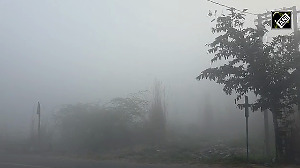The media must confine itself to honest journalism and not use it as a tool to expand its influence and business interests, Chief Justice of India (CJI) NV Ramana said on Tuesday.

Ramana said a media house with "other business interests" becomes vulnerable to external pressures and often business interests prevail over the spirit of independent journalism which compromises democracy.
Asserting that independent journalism is the "backbone of democracy”, the CJI -- a former journalist -- also urged the stakeholders to introspect on why the standards here are not considered good enough for international recognition and laurel in the field of journalism.
He was speaking at the launch of Gulab Chand Kothari's book titled The Gita Vijnana Upanishad. Lok Sabha Speaker Om Birla presided over the event.
Last week, the CJI had raised similar concerns and said ”agenda driven debates” and ”kangaroo courts” being run by media are detrimental to the health of democracy.
These recent remarks by Ramana assume significance following the backlash to a verdict earlier this month on former BJP spokesperson Nupur Sharma's comments on Prophet Mohammed, which the Supreme Court said had stoked communal tension across the country.
”When a media house has other business interests, it becomes vulnerable to external pressures. Often, the business interests prevail over the spirit of independent journalism. As a result, democracy gets compromised,” Ramana said on Tuesday.
”Journalists are the eyes and the ears of the people. It is the responsibility of media houses to present facts. Especially in the Indian social scenario, people still believe that whatever is printed is true. All I want to say is that the media must confine itself to honest journalism without using it as a tool to expand its influence and business interests,” he said.
While the country's senior-most judge acknowledged the presence of ”journalists who are equally enthused in today's media”, he remarked that when a brilliant story filed by a journalist is killed at the desk, it is thoroughly demoralising.
He said the ”true nature” of a media house would be assessed and appropriate conclusions drawn from their conduct during testing times as he recollected that ”only media houses without business baggage, were able to fight for democracy during the dark days of Emergency”.
CJI Ramana also said there was no ”systemic support” for journalists in the country and neither was there an award which was comparable to the Pulitzer or ”many Pulitzer winning journalists”.











 © 2025
© 2025